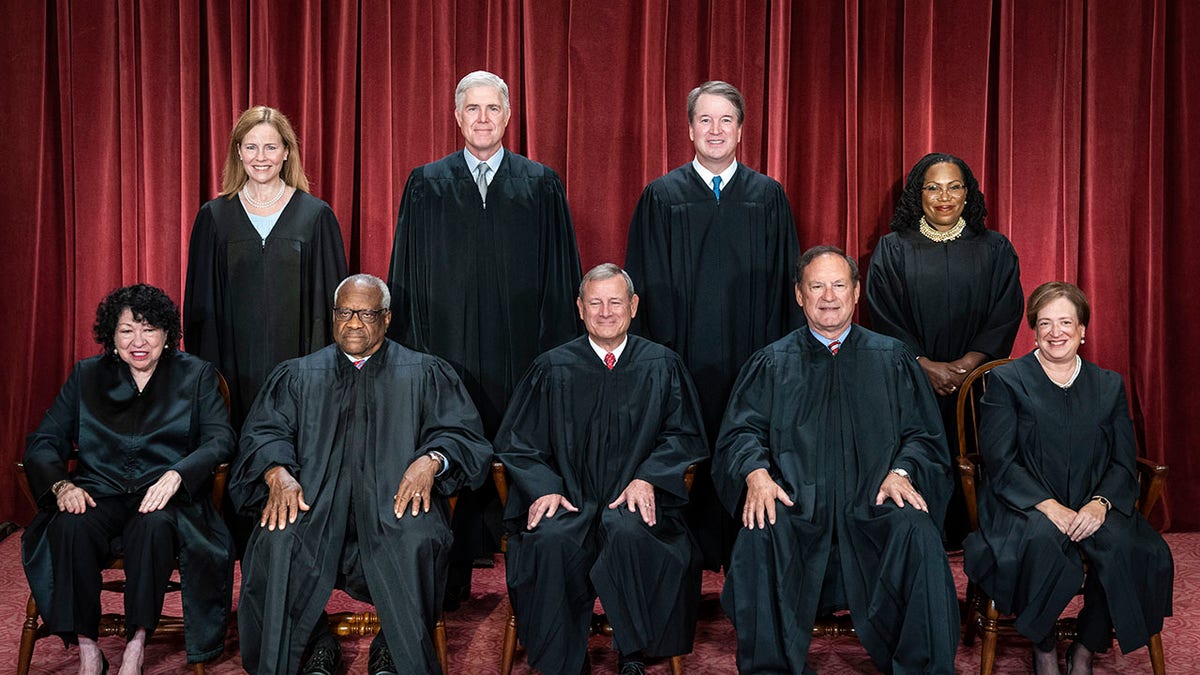Border Patrol losing 'imperative' surveillance blimps: Chris Cabrera
National Border Patrol Council spokesperson Chris Cabrera warns President Biden scaling back on blimps is going to cause a 'tremendous negative effect.'
The Supreme Court announced Thursday that the case deciding the fate of the Title 42 public health order — which has been used to expel hundreds of thousands of migrants at the U.S. southern border due to the COVID-19 pandemic — has been dropped from the court’s calendar.
The court did not provide any explanation for the move. However, it comes after the Biden administration said the case could be "moot" given that the order will end when the COVID-19 public health emergency ends in May.
Title 42 has been used by both the Trump and Biden administrations since March 2020 to rapidly expel migrants at the border due to the COVID-19 pandemic. The Biden administration attempted to end the order last year, but was blocked by a federal court order.
In a separate case later in the year that sought to force the administration to end Title 42, the Supreme Court took up the case after a last-ditch request for a stay from GOP-led states after a federal court sided with the plaintiffs. It had been expected to rule in the spring, delaying concerns of a fresh migrant surge until then.
BIDEN ADMIN DENIES ‘MASS DEPORTATIONS’ OF NON-MEXICANS IN THE WORKS AS IT EYES MAY END TO TITLE 42

The members of the Supreme Court sit for a group photo following the recent addition of Associate Justice Ketanji Brown Jackson at the Supreme Court building on Capitol Hill in Washington, D.C., on Oct. 7, 2022. (Jabin Botsford/The Washington Post via Getty Images)
However, in a court filing earlier this month, the Justice Department said that "the anticipated end of the public health emergency on May 11, and the resulting expiration of the operative Title 42 order, would render this case moot."
President Biden had announced last month that the COVID-19 emergency declaration would end on May 11. The lawyers stated further that because the Title 42 order would have "expired by its own terms," the suit seeking only prospective relief would "no longer present a live case or controversy."
With this move, the GOP-leaning states that had sued to keep Title 42 in place may soon file a new lawsuit, seeking to delay enforcement of the May 11 deadline, at least as applied to Title 42.
Should Title 42 end in May, it would be ending at a time when migrant encounters typically increase. Officials had predicted last year up to 14,000 encounters a day when the order ends.
But without any new move by Republican states, the move by the administration and now the courts again sets a timeline on the end of the order, which has been used as a stopgap by the Biden administration to prevent mass releases into the interior amid a historic migrant crisis that has seen millions of migrants hit the border in the last two years.
Court records show that the policy has been used more than 2.5 million times to expel migrants at the southern border.
The Department of Homeland Security has repeatedly said it has a six-point plan to deal with what is expected to be an enormous surge at the southern border once the order ends. That includes increasing resources to the border, greater cooperation with Mexico, more anti-smuggling operations and greater use of alternative removal authorities contained within the primary Title 8 authority.
While the administration has laid out its general plan for post-Title 42 border policy, it is unclear what specifically that will look like.
MIGRANT ENCOUNTERS HIT 156,274 IN JANUARY AS BIDEN ADMIN CLAIMS NEW BORDER MEASURES ‘ARE WORKING’
The Washington Post reported last week that President Biden was weighing a deal that would allow hundreds of thousands of migrants to enter the U.S. legally, but also allow "large-scale deportations" of non-Mexicans back into Mexico. According to the outlet, the plan would hand control over key details, such as the nationalities of those being deported, to Mexican authorities.
However, DHS shot down the report a day later
"Reports that we are considering mass deportations of non-Mexicans to Mexico are false," DHS spokesperson Marsha Espinosa said in a Twitter post.
"We’re continuing to work closely with govt of Mexico to implement our successful border enforcement plan which has already resulted in the lowest encounter numbers between ports of entry in 2yrs," Espinosa tweeted.
There have already been indications that the end of Title 42 will lead to a massive surge in migration, beyond DHS' own estimates. As the fate of Title 42 was scheduled to end in December, apprehensions at the border shot up even above the already high numbers being seen — with 251,000 migrant encounters at the border that month alone, marking a new record.
The Biden administration announced new border measures in January that expand a humanitarian parole program to include Venezuelans, Cubans, Haitians and Nicaraguans and allows 30,000 nationals to enter a month if they have a sponsor, do not enter illegally and pass background checks.
Meanwhile, the administration also expanded Title 42 expulsions to include those nationalities and is expected to introduce a rule in the next month that will forbid migrants from applying for asylum if they have passed through another country and failed to apply there.
CLICK HERE TO GET THE FOX NEWS APP
Officials have said that the policy is working, and Biden noted in his State of the Union address that encounters of those nationalities have dropped 97%. January’s border numbers, meanwhile, were around 156,000. While those marked the highest January on record, Customs and Border Protection noted that the new numbers are a sharp drop from the record 251,978 encounters in December. It also marked the first month in 10 months in which encounters were below 200,000 encounters.
Officials also said that the number of migrants encountered by Border Patrol entering illegally between ports of entry (128,410) was the lowest number seen since February 2021.







